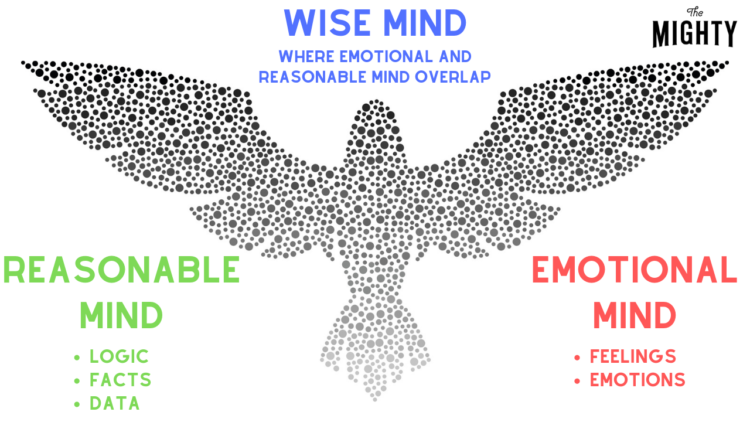If You Feel ‘Too Emotional’ (or Not Emotional Enough), Here’s a Skill You Need
If you’ve ever felt “too emotional” or “not emotional enough,” you’re in good company. Most of us have struggled at one time or another with feeling either (or both) of these fears.
We all have a different relationship with our emotions. Some of us are tried and true “feelers” who feel overtaken by our emotional experiences on a pretty regular basis. Others of us aren’t as touchy feely and may struggle with believing we are emotional enough. (P.S. If you have trouble identifying your emotions, check out this emotion chart that might help.)
The good news is, it doesn’t matter what kind of “feeler” you are because there’s one skill we think can help you navigate feeling “too much” or “too little.” It’s called “Wise Mind,” and it’s a skill found in dialectical behavior therapy (DBT). When you’re facing a difficult circumstance and don’t know what to do, Wise Mind can help you cope effectively and make balanced decisions (with your heart and your head!).
To better understand “Wise Mind,” we spoke to Stephanie Vaughn Psy.D., a DBT-certified specialist, and Gimel Rogers, Psy.D., who works with patients who have lived through significant trauma. Here’s what they had to say about Wise Mind:
What Are the Three Mind States?
According to dialectical behavior therapy (DBT), we all have three mind states: Emotional Mind, Reasonable Mind and Wise Mind. Dr. Rogers told The Mighty most of us have a natural tendency to stay in either Emotional Mind or Reasonable Mind, but all of us have the ability to access our Wise Mind. We’ve broken down the differences of each mind state below.
Emotional Mind
You might have guessed from it’s name, but Emotional Mind relates to emotions and feelings. A person who is in the Emotional Mind state typically thinks and acts based on their feelings, not by assessing the facts of the situation. Dr. Vaughn said Emotional Mind is the part of us that “runs hot” and the intensity of our behavior in this state usually matches the intensity of what we are feeling in the moment.
For example, if you’re feeling really down and decide to take a trip to your local animal shelter to cheer up, your Emotional Mind might decide impulsively that it’s a good time to adopt a puppy, even though your apartment doesn’t allow animals (a fact your Emotional Mind doesn’t consider). Sometimes, it may not be in your best interest to make a decision solely using your Emotional Mind.
If you are a highly sensitive person (HSP), live with borderline personality disorder or struggle with emotional regulation in general, you might have more of a tendency to react and decide with just your Emotional Mind.
Reasonable Mind
If our Emotional Mind “runs hot,” Reasonable Mind is the part of us that “runs cold.” Reasonable Mind is when our thoughts and actions reflect data collecting, logic and facts — you’re intellectualizing most situations. Rogers told The Mighty folks with anxiety disorders often have a tendency toward Reasonable Mind.
Some people might be tempted to believe the goal should be to stay in Reasonable Mind all the time, Vaughn explained, but according to DBT, the key is actually to identify with your Wise Mind as often as you can. Your Emotional Mind contains information that will help you make better decisions you can’t do using only your Reasonable mind state.
Let’s say you are a person with a tendency toward Reasonable Mind and we put you in the puppy-adopting scenario mentioned above. Maybe you’ve always wanted a dog — not to mention you have the financial means and space to support one. But you talk yourself out of getting the puppy because you think you’re making an “irresponsible” decision based only on a list of the logistics. In this case, remaining in Reasonable Mind means you’ll miss the joy you would feel from getting a dog.
Wise Mind
Wise Mind is the the mental state where elements of your Emotional Mind and Reasonable Mind coexist. Rather than simply thinking or feeling a certain way, Wise Mind includes an element of personal intuition with information from both your Emotional and Reasonable minds.
“Wise Mind is the deeply personal sense of knowing,” Vaughn said. “It is the part of us that is informed by facts and sees the emotional side as being equally important.”
Some people experience the Wise Mind sense in their body physically — like knowing “in your bones” or heart something is right for you. Others might feel an answer float into their head that just feels right. Every person’s experience is unique, so only you can know what your own Wise Mind says.
In order to illustrate the intersection between Emotional Mind and Reasonable Mind, Rogers presented a bird analogy, which we’ve illustrated in the diagram below.

Rogers said if we were to label the mind states on a bird, Emotional Mind would be one of the bird’s wings, and Reasonable Mind the other. She said just like a bird, if we favor one mind state (a.k.a. wing) over the other, we won’t be able to “fly straight.”
“In order for any type of bird to fly, you need both wings,” Rogers explained. “You need both of those mind states to make wise decisions.”
When you are in Wise Mind, you are considering both mind states to make more balanced decisions that take into account both your thoughts and feelings to combine that wisdom and see the whole picture more clearly. As we mentioned before, Wise Mind is unique to each individual, so no one but you can tell you what your Wise Mind is saying.
Who Should Use the Wise Mind Skill?
Though DBT was initially created to help people struggling with self-harm, suicidal thoughts and borderline personality disorder (BPD), DBT skills, including Wise Mind, can be beneficial to anyone.
In addition to folks who feel “too much” or “too little,” Wise Mind can help people who vacillate between Emotional and Reasonable Mind — folks who may struggle with knowing how they really feel. Vaughn explained how this could play out:
It becomes a situation in which Reasonable and Emotional Mind get into a sort of bickering match with one another. For example, the person has strong feelings about a situation (Emotional Mind) but Reasonable Mind steps in to suggest that, based on the facts, one should not feel that way. The fight becomes about which state of mind is correct.
In moments like these, DBT would suggest turning to Wise Mind for clarity. But how do you do that? Below we share some practical tips for using the Wise Mind skill.
How Do You Use Wise Mind?
It doesn’t matter if you lean more toward Emotional Mind, Reasonable Mind or a combo of both, anyone can learn to use Wise Mind. A big part of accessing your Wise Mind is being in touch with your thoughts and emotions, or in other words, knowing what mind state you are using in a given moment.
Rogers told The Mighty a key strategy for knowing what mind state you’re in is practicing the first skill taught in DBT — mindfulness. Mindfulness is paying attention to your thoughts and feelings in the present moment without judgment. Part of being mindful is being aware of what’s going on internally (thoughts, feelings, sensations and impulses), but also what’s going on outside of yourself (what you see, smell, hear and feel).
A good mindfulness technique both Rogers and Vaughn recommend is taking a step back and asking yourself questions. If you have a suspicion a friend is mad at you, for example, you might consider asking yourself questions like the following:
‘What are the facts to support his belief?’
‘Is sending an impulsive and angry text message to my friend in line with my values?’
‘Do I need to call my friend to ask them if they are mad at me at 2 a.m. or can I wait until the morning?’
‘How would I want my friend to respond to me if they thought I was mad at them?’
“With any situation, ‘difficult’ or not, it is about asking Wise Mind questions,” Vaughn said. “Asking Wise Mind questions can yield comforting results, but you have to truly wait for the answer. It can’t be forced. Since Wise Mind is the truest and deepest part of you, you can trust it to provide accurate answers.”
If you try to listen for Wise Mind in a tough moment and can’t hear or feel it — don’t panic. Like any skill, learning to hear your Wise Mind takes time, practice, and most importantly, patience, especially because your Emotional and Reasonable minds can trick you into believing they are the “right” way to go. We encourage you to keep working at it because in the long-run, using Wise Mind will help you make better decisions according to your values.
In her piece, “The One Part of Dialectical Behavior Therapy That Helps Me Most,” Mighty contributor Daphnée L. shares the way she taps into her own Wise Mind:
Whenever I want to access Wise Mind, I will imagine ‘going into my therapist’s office’ and asking her what she thinks about a certain situation. I will then ‘listen’ for an answer, and act from there. This works for me, especially because I consider my own therapist’s office to be a safe and sacred space.
If you struggle with feeling your emotions strongly or “not strongly enough” we want you to know you’re not alone. Remember, accessing Wise Mind takes time and practice. Keep working at it, and feel free to share your progress on The Mighty by posting with the hashtag #MentalHealth.
For more on DBT skills, check out the following stories from our Mighty community:
Unsplash photo via Kamil Feczko

